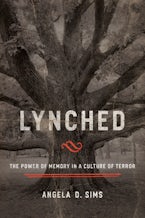Lynched brings a novel and innovative approach to the study of the horrific history of lynching in the United States. Angela Sims has gathered a gold mine of information contained in the oral histories of elderly African Americans which forms the basis for Lynched. The respondents' memories about, and reckoning with, lynching provide rich texture to the burgeoning literature that documents and analyzes a shameful period of American history.
~Stewart E. Tolnay, S. Frank Miyamoto Professor of Sociology, University of Washington
We need to remember the horror of domestic terrorism that black people have experienced for centuries in the United States, the land of their birth. Remembering and resisting are the only ways to stop terrorism today. We are in debt to Angela Sims and her interviewees for this important work of remembrance, which should inspire us to never forget and never stop resisting.
~James H. Cone, Bill & Judith Moyers Distinguished Professor of Systematic Theology, Union Theological Seminary
In this astonishingly sober and sage work, ethicist Angela Sims baptizes us by immersion in the memories of lynching. The African American elders whom she interviews are as godparents to us all--unwrapping memories and holding up the horror, uncovering the history the nation represses, dispensing terrible knowledge. This is theology as elegiac and embodied protest against the erasure of memory, against the cost of forgetting.
~M. Shawn Copeland, Professor of Systematic Theology, Boston College
Sims offers ethical insights that shed light on lynching culture and how we continue to experience its effects today.
~James L. Gorman, Reading Religion
Using oral histories, Sims provides the Christian community with a canon of testimonies that illustrate the scriptural imperative to walk by faith and not by sight. The testimonies of the African American elders are replete with biblical allusions and comparisons, such as the failure to love one’s neighbor, the suffering servant, the road to Calvary, and the trek to the lynching tree.
~Marcia Y. Riggs, Interpretation: A Journal of Bible and Theology
Simply for the way it collects and preserves the stories of dozens of African American survivors of the lynching era, Angela D. Sims' Lynched should be considered required reading for every US citizen. But in explicating the theological, sacramental, ethical, and ecclesiological significance of these memories, Sims makes a vital contribution to the field of theology as well.
~Katie Grimes, Horizons: The Journal of the College Theology Society
Sims reveals how memories of violence and damage inflicted by whites help African Americans understand contemporary American culture not as having ended the peril of violence but as having continued it in different ways.
~Donald G. Mathews, Journal of Ecclesiastical History
Lynched is a noteworthy and useful contribution to African American studies. Undergraduate or graduate students would benefit from reading Sims’s work, especially if paired with a study of how mainstream memories of lynching are shaped…
~Hollie A. Teague, The Journal of African American History
I applaud Sims for her courage, and for her reasoned responses to the horrors and narratives of which she has become the keeper. This is a book for anyone who hopes to see areas such as memory studies step out of the shadows and into a limelight of ways of collecting, archiving, and ultimately dealing with historical narratives of trauma and terror for the next generations.
~Raymond W. Radford, Journal of Religious History
As a whole, Lynched is a groundbreaking work of theology that deserves a wide reading. Three specific aspects of Sims’s book are worth highlighting. First, the testimonies about lynching that Sims collects are intrinsically valuable. Second, Sims masterfully connects these testimonies to contemporary events, a connection that many of the participants in her oral history project make themselves…. Third and finally, Sims offers words of wisdom for white readers.
~Ryan Andrew Newson, Perspectives in Religious Studies
Lynched is a noteworthy and useful contribution to African American studies. Undergraduate or graduate students would benefit from reading Sims's work...
~Hollie A. Teague, Journal of African American History

